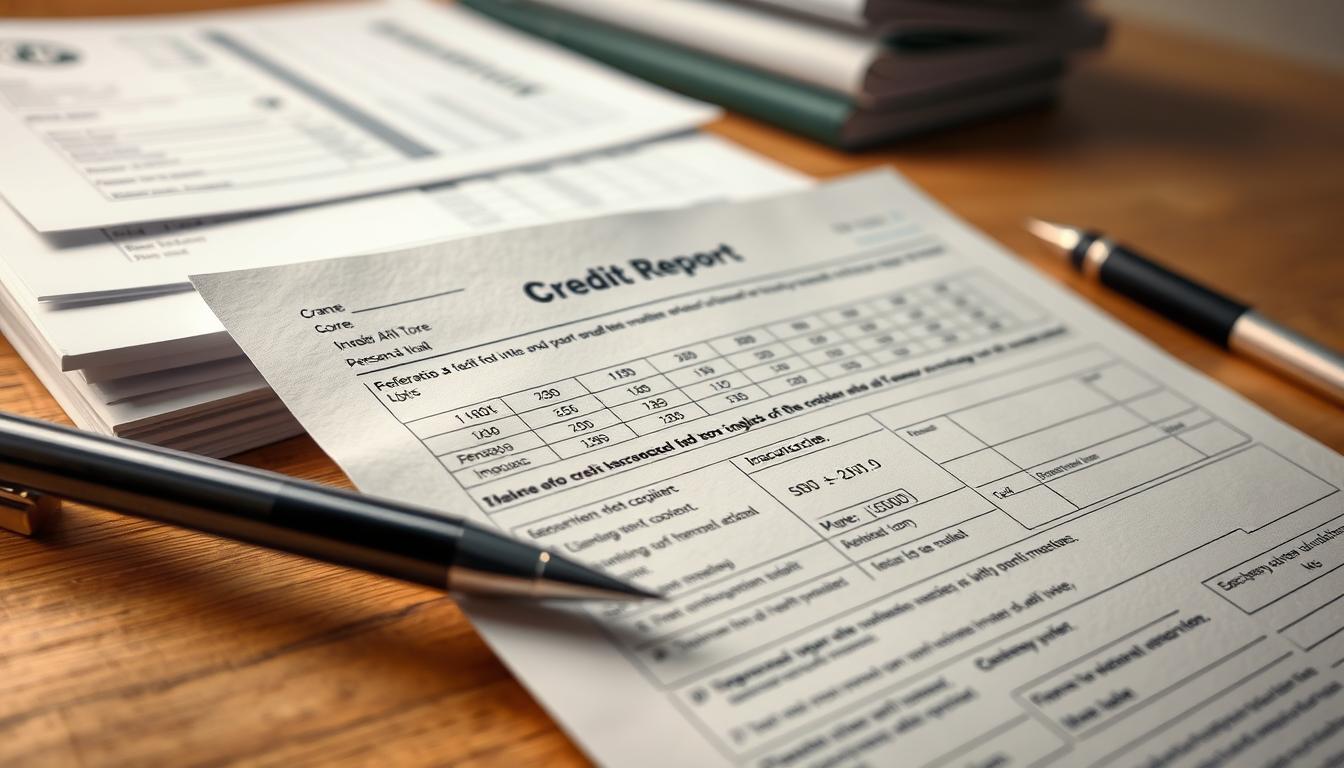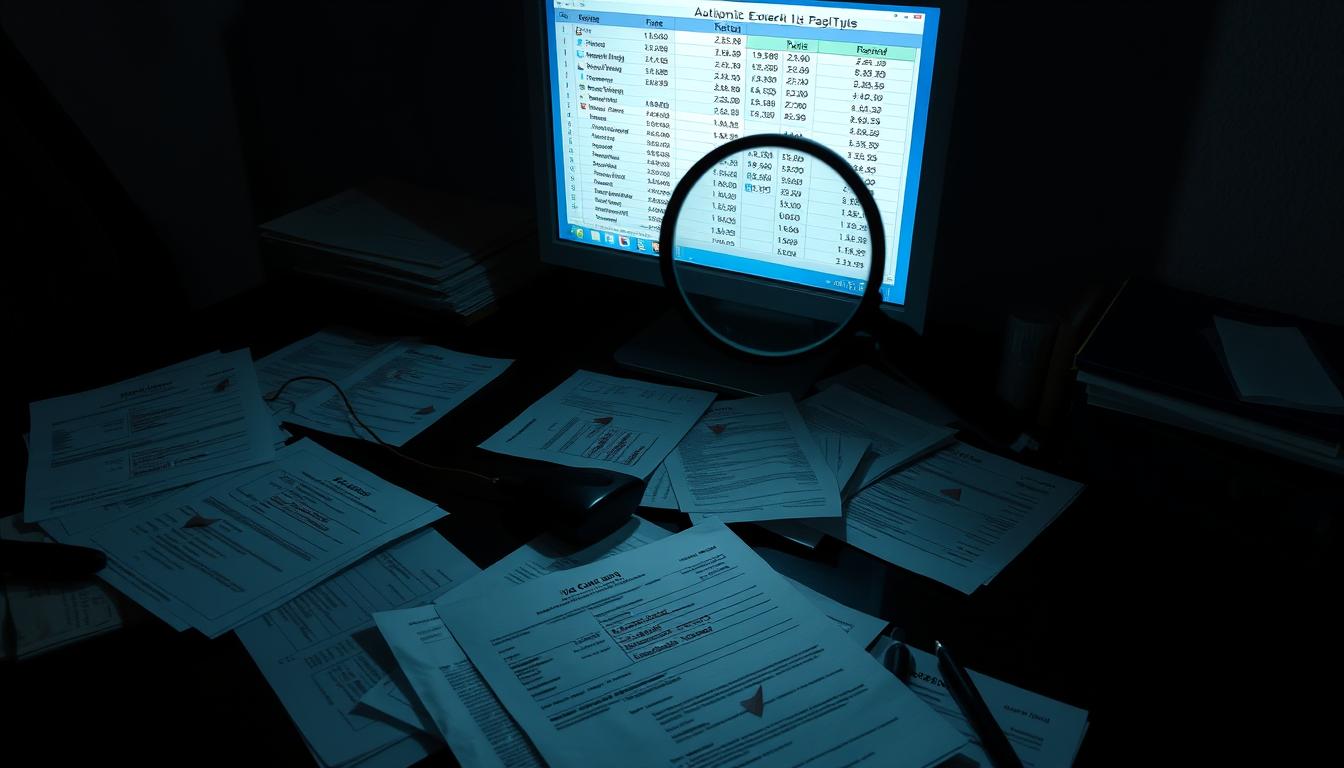Credit bureaus are key players in maintaining accurate consumer credit reports. They must investigate disputed, inaccurate, fraudulent, outdated, erroneous, or unverified items. Accurate reports are vital for financial opportunities and healthy credit scores.
This article explores credit report accuracy and the bureau’s duty to investigate disputes. We’ll also cover steps consumers can take to ensure their credit report is correct.
Key Takeaways
- Credit bureaus must investigate all disputed, inaccurate, fraudulent, outdated, erroneous, or unverified items on consumer credit reports.
- Accurate credit reports are essential for accessing financial opportunities and maintaining a healthy credit score.
- Consumers have the right to dispute inaccurate or fraudulent information on their credit reports.
- The Fair Credit Reporting Act (FCRA) requires credit bureaus to investigate disputed items and correct any errors.
- Outdated, erroneous, and unverified information can negatively impact an individual’s credit profile and financial well-being.
Importance of Accurate Credit Reports
Accurate credit reports are vital for financial success. Inaccurate or erroneous information can harm your credit access and job prospects. Errors on a credit report can lead to significant consequences, like higher costs and damaged financial health.
Impact on Financial Opportunities
Credit reports influence loan, credit card, and mortgage approvals. They also affect employment chances. Inaccurate or erroneous information can result in rejections and higher interest rates.
This can severely limit your impact on financial opportunities. It may hinder your ability to reach important money goals.
Consequences of Errors and Inaccuracies
- Denied applications for loans, credit cards, or mortgages
- Higher borrowing costs due to unfavorable interest rates
- Potential damage to an individual’s overall financial well-being
- Consequences of errors and inaccuracies can have far-reaching impacts on an individual’s financial future
| Impact | Consequence |
|---|---|
| Denied applications | Limited access to financial opportunities |
| Higher interest rates | Increased borrowing costs |
| Potential financial damage | Long-term impact on financial well-being |

“Maintaining an accurate credit report is essential for individuals seeking financial success. Errors and inaccuracies can have far-reaching consequences that can hinder one’s ability to achieve their financial goals.”
The Credit Bureau Needs To Investigate All Items That Are
Credit bureaus must investigate every disputed, inaccurate, fraudulent, outdated, erroneous, or unverified item on credit reports. This process ensures the accuracy of information that affects a person’s financial future.
Consumers can dispute issues on their credit reports with the bureaus. The bureaus must then investigate and correct these problems to maintain accurate credit histories.
Wrong information can lead to loan denials or higher interest rates. Credit bureaus protect consumers by fixing these issues quickly and thoroughly.
| Credit Report Item | Credit Bureau Responsibility |
|---|---|
| Disputed Items | Investigate and resolve disputes |
| Inaccurate Information | Correct inaccurate data |
| Fraudulent Entries | Identify and remove fraudulent information |
| Outdated Records | Ensure credit information is up-to-date |
| Erroneous Data | Identify and fix common credit report errors |
| Unverified Information | Verify the accuracy of credit report data |
Credit bureaus help consumers by fixing report issues quickly. This ensures accurate and reliable credit histories. It’s vital for financial health and success.
Disputed Items
Consumers can challenge any inaccurate or unverified item on their credit report. This process protects individuals and ensures their creditworthiness is accurately represented. It’s a vital safeguard for maintaining fair credit reporting.
Consumer Rights and Dispute Process
When spotting a disputed item, consumers can file a formal complaint with credit bureaus. The bureaus must then investigate the issue within a set timeframe. This process upholds the accuracy of credit reports.
Credit bureaus are required to respond promptly to consumer disputes. This investigation helps maintain the integrity of credit reporting systems. It’s a key mechanism for protecting consumer rights.
- Consumers can dispute any item they believe to be disputed, inaccurate, or unverified.
- Credit bureaus must investigate disputed items and respond to the consumer within a defined period.
- The dispute process is a critical mechanism for ensuring consumer rights and credit report accuracy.
By engaging in the dispute process, individuals help maintain reliable credit reporting. This active participation supports fairness in the credit system. It’s a powerful way for consumers to protect their financial interests.
“The dispute process is an important safeguard for consumers to ensure the information on their credit report is accurate and reflects their true creditworthiness.”

Inaccurate Information
Credit reports can contain various errors. These range from wrong account balances to misreported late payments. Such mistakes can seriously impact a person’s financial opportunities.
Credit bureaus must investigate claims of inaccuracies thoroughly. They should make necessary corrections to ensure accurate representation of creditworthiness. This is crucial for consumers seeking loans, credit cards, housing, or employment.
A common issue is the inclusion of unfamiliar accounts. These fraudulent entries can harm credit scores. Consumers must work with credit bureaus to identify and remove such inaccurate information.
Incorrect reporting of late payments or high balances is another problem. This can happen due to errors, system issues, or identity theft. Consumers have the right to dispute these inaccuracies.
| Type of Inaccurate Information | Potential Impact | Dispute Process |
|---|---|---|
| Accounts that do not belong to the consumer | Damaged credit score, difficulty obtaining credit | Contact credit bureau, provide proof of identity |
| Incorrect account balances or late payments | Lowered credit score, higher interest rates | Dispute the inaccurate information with the credit bureau |
| Outdated or unverified information | Inaccurate representation of creditworthiness | Request the credit bureau to investigate and update the information |
Consumers should stay alert and address any credit report errors promptly. This ensures accurate representation of their financial history. It also opens doors to better financial opportunities and a brighter future.

Fraudulent Entries
Fraudulent entries on credit reports can seriously harm your finances. These include unauthorized accounts and misused personal information. Credit bureaus must investigate fraud cases and work with consumers to address these issues.
Identifying and Reporting Fraud
Spotting fraudulent entries on your credit report is vital. It helps maintain the credit system’s accuracy and reliability. Watch your credit reports closely for any unusual activity.
Look out for accounts you didn’t open or authorize. Be aware of inquiries from unknown sources. Notice sudden changes in credit use or payment history.
If you suspect fraud, act fast. Report it to the credit bureaus right away. File a dispute and provide evidence to support your claim.

Stay vigilant and report fraud promptly to protect your finances. Team up with credit bureaus to tackle these issues. This teamwork ensures accurate and reliable credit reporting for everyone.
Outdated Records
Credit bureaus must keep credit reports accurate and up-to-date. The Fair Credit Reporting Act (FCRA) requires them to remove certain information after a set time. This includes bankruptcies, collections, and other negative data.
Removing outdated info ensures credit reports reflect current financial standing. This helps consumers access the financial opportunities they deserve. Credit bureaus maintain a fair system by following FCRA time limits.
Credit Reporting Time Limits
Credit bureaus must investigate and remove expired information. This process upholds the integrity of credit reports. It helps mitigate the impact of outdated records on consumers.
| Type of Information | Maximum Reporting Period |
|---|---|
| Bankruptcies | 10 years |
| Foreclosures | 7 years |
| Repossessions | 7 years |
| Delinquent Accounts | 6 years |
| Judgments | 7 years |
| Tax Liens | 10 years |
Following these time limits ensures outdated records don’t impact consumers’ financial opportunities. This promotes fairness in credit reporting. Both lenders and borrowers benefit from this transparent process.
“Outdated records can limit access to credit, jobs, or housing. Credit bureaus must remove this information quickly to protect consumers.”
Erroneous Data
Credit reports shape our financial lives. They determine our creditworthiness and access to financial opportunities. However, these reports can contain errors that impact a consumer’s credit profile.
Mistakes in credit reports can affect loan approvals and credit card applications. They may also influence other financial products. Errors can range from simple typos to complex issues like fraudulent accounts.
Common Errors and Their Consequences
Credit reports often contain various types of inaccuracies. These can include personal information errors and misattributed debts. Let’s explore some common mistakes found in credit reports.
- Incorrect personal information, such as name, address, or Social Security number
- Accounts that do not belong to the consumer, either due to identity theft or clerical mistakes
- Incorrect account balances, payment history, or credit limits
- Duplicate entries for the same account
- Closed accounts still appearing as open
These erroneous data can lead to serious financial problems. Lower credit scores, higher interest rates, and credit application denials are possible outcomes. Such mistakes can hinder consumers from getting mortgages, car loans, or rental agreements.
| Error Type | Potential Impact |
|---|---|
| Incorrect personal information | May lead to misattribution of accounts and lower credit score |
| Fraudulent accounts | Can significantly damage credit profile and creditworthiness |
| Incorrect account details | May result in higher interest rates or denial of credit applications |
| Duplicate entries | Can inflate debt levels and negatively impact credit utilization ratio |
The impact of erroneous data on consumers’ finances is significant. Credit bureaus must investigate inaccuracy claims thoroughly. They should make necessary corrections to ensure credit report information is accurate and reliable.
Unverified Information
Credit bureaus maintain consumer credit reports. Sometimes, they include unverified information in these financial documents. This can mislead and harm a consumer’s creditworthiness, limiting their financial opportunities.
Credit bureaus must verify data before adding it to reports. Unverified information should be investigated and removed. This ensures the report’s reliability and accuracy.
Unchecked unverified information can distort an individual’s financial history. It may give a false picture of their creditworthiness. This can impact their financial future.
- Unverified information can include incorrect account details, inaccurate payment histories, or even fraudulent entries.
- Consumers have the right to dispute any unverified information on their credit reports and request its removal or correction.
- Credit bureaus must comply with the Fair Credit Reporting Act (FCRA) and ensure that all information included in credit reports is accurate, up-to-date, and properly verified.
Addressing unverified information helps maintain accurate credit reports. This enables consumers to access deserved financial opportunities. It also allows for informed decisions about creditworthiness.
Data integrity is crucial for a fair credit system. It benefits both consumers and lenders. Accurate reports help build a transparent financial landscape.
“Ensuring the accuracy of credit reports is paramount for consumers to achieve their financial goals and maintain a healthy credit profile.”
Responsibilities of Credit Bureaus
Credit bureaus collect and maintain consumer credit information. They must ensure the accuracy of the data they report. These organizations follow the Fair Credit Reporting Act (FCRA) to protect consumer rights.
Fair Credit Reporting Act (FCRA) Compliance
The FCRA requires credit bureaus to investigate disputed items on credit reports. They must verify information and fix any errors. Accurate credit data is crucial for people seeking loans, credit cards, or jobs.
Credit bureaus must protect consumer information from unauthorized access. This helps prevent identity theft and credit-related fraud. Their role in safeguarding data is vital to the financial landscape.
By following FCRA standards, credit bureaus provide reliable credit information. They demonstrate their commitment to consumer trust. This upholds the integrity of the financial system.

